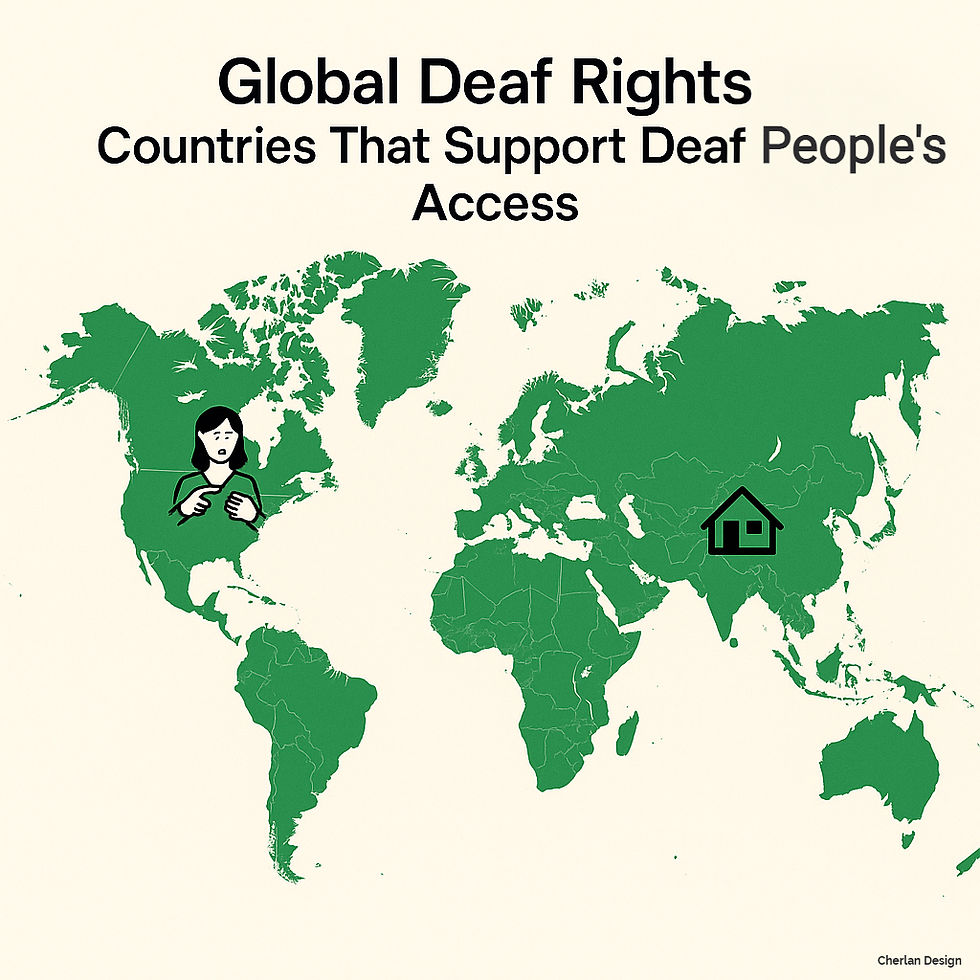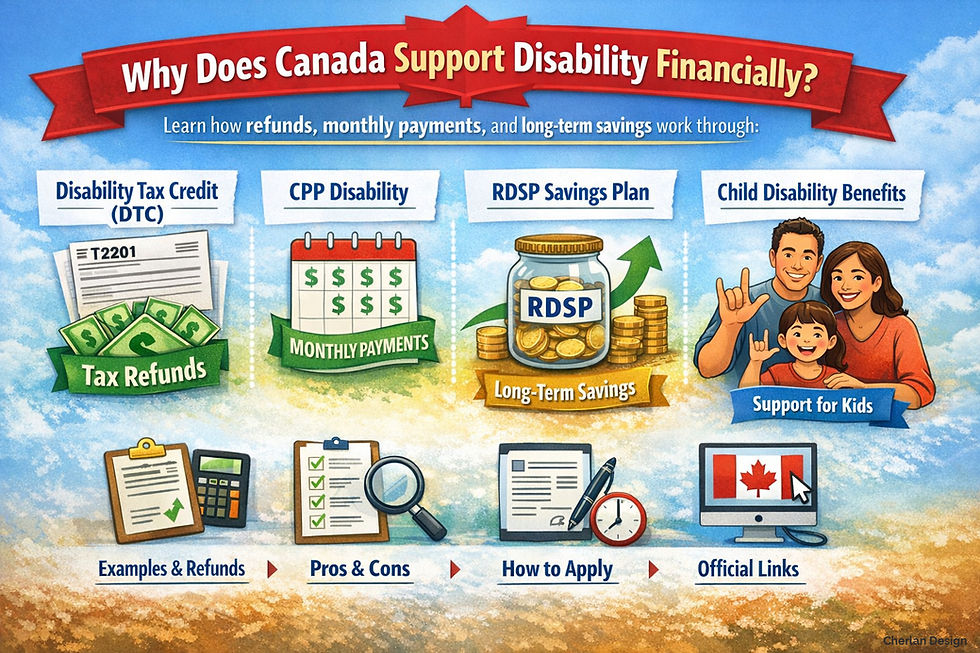Global Deaf Rights: Which Governments Support the Deaf Community—and Which Still Don't?
- Cheryll Atienza

- Aug 3, 2025
- 4 min read
Updated: Aug 4, 2025

All around the world, Deaf people are fighting for the same rights that hearing people take for granted: education, communication access, housing, driving, healthcare, and respect. Yet many governments still do not fully recognize Deaf people’s needs or legal rights, while others provide strong support, including interpreters, funds, housing, education in sign language, and more.
This blog post will explain:
Countries with strong Deaf rights and government backing
Those with moderate or limited support
Nations with little to no recognition or services
The importance of housing for Deaf people
A special focus on Deaf rights in Africa
Encouragement for Deaf communities to keep fighting
Countries That Support Deaf People's Rights (Best to Strong)
These countries offer excellent support to Deaf communities, with laws, funding, and cultural recognition:
Sweden
Swedish Sign Language officially recognized.
Free interpreters in education, healthcare, and government.
Accessible and subsidized housing with Deaf-friendly modifications.
Driving rights fully allowed for Deaf individuals.
Finland
Finnish Sign Language legally recognized.
Government funds housing modifications and disability benefits.
Strong Deaf education programs and interpreting services.
Denmark
Public housing programs tailored for people with sensory disabilities.
Full access to interpreters and sign language support in public services.
Australia
National Disability Insurance Scheme (NDIS) supports Deaf people with housing, interpreters, and education.
Auslan (Australian Sign Language) is promoted and supported widely.
Norway
Norwegian Sign Language is official.
Comprehensive housing support and interpreter access.
France
French Sign Language legally recognized.
Access to interpreters and driving rights.
Deaf education available.
Canada
ASL and LSQ recognized in some provinces.
Disability benefits (AISH, CPPD, CDB) support Deaf individuals.
Some provinces offer housing subsidies and Deaf education programs.
United States
Americans with Disabilities Act (ADA) protects Deaf rights.
Deaf people can drive, attend Deaf colleges, and receive Section 8 housing.
Interpreter services required in public and private institutions.
Countries with Moderate Support (Still Growing)
Brazil
Brazilian Sign Language (Libras) recognized.
Interpreting and education access limited in rural areas.
Housing support minimal.
Mexico
Mexican Sign Language used, not fully funded.
Few interpreters in government and healthcare.
No specific Deaf housing programs.
South Africa
South African Sign Language (SASL) recognized recently.
Interpreter services patchy; housing and funding limited.
Driving allowed.
Argentina
Argentine Sign Language widely used but not officially recognized.
Deaf education exists with funding gaps.
No Deaf-specific housing.
Philippines
Filipino Sign Language (FSL) officially recognized since 2018.
Interpreter services and housing support very limited.
Driving allowed; advocacy growing.
United Kingdom
British Sign Language recognized.
Disability housing grants exist, but no Deaf-only housing.
Interpreter access in many services.
Countries That Do Not Support Deaf People (Very Weak or No Support)
Saudi Arabia
No recognition of sign language.
Very limited education and work opportunities for Deaf individuals.
Deaf women face extra discrimination, especially with driving.
Pakistan
No official recognition of Pakistani Sign Language.
Extremely limited schools and interpreting services.
No housing support or legal protections.
Afghanistan
No Deaf schools or government-funded programs.
High discrimination and no interpreters or housing.
Deaf people often hidden and unsupported.
Somalia
Very little to no support for Deaf people.
No interpreters, schools, or health access.
Deaf people struggle to survive, relying on family.
Which Governments Provide Deaf People Housing Support?
Here are the countries that give strong housing or financial help to Deaf people:
Country | Housing Support | Modifications Paid For | Deaf-Specific Programs |
🇸🇪 Sweden | ✅ Yes | ✅ Yes | ✅ Yes |
🇫🇮 Finland | ✅ Yes | ✅ Yes | ✅ Yes |
🇩🇰 Denmark | ✅ Yes | ✅ Yes | ✅ Yes |
🇳🇴 Norway | ✅ Yes | ✅ Yes | ✅ Yes |
🇦🇺 Australia | ✅ Yes (NDIS) | ✅ Yes | ✅ Yes |
🇨🇦 Canada | ⚠️ Some provinces | ✅ Yes | ⚠️ Few only |
🇺🇸 USA | ⚠️ Section 8 only | ⚠️ Some support | ❌ No Deaf-specific |
🇵🇭 Philippines | ❌ None | ❌ No support | ❌ None |
🇦🇷 Argentina | ❌ None | ⚠️ Limited grants | ❌ None |
🇵🇰 Pakistan | ❌ None | ❌ None | ❌ None |
Deaf Rights and Support in Africa
Africa shows mixed progress for Deaf rights:
South Africa
SASL recognized.
Interpreter access growing.
Some disability housing available.
Kenya
Kenyan Sign Language recognized in the constitution.
Deaf schools exist but lack funding.
Interpreter services limited.
No Deaf-specific housing.
Ghana
Ghanaian Sign Language taught in some schools.
Interpreters and housing support limited.
Nigeria
Nigerian Sign Language not officially recognized.
Few interpreter services; housing support lacking.
Somalia, Ethiopia, Uganda and others
Very limited to no government support.
Deaf communities rely heavily on NGOs and families.
FAQs
Q: Can Deaf people drive in every country?
A: Not in all countries. In some places like the U.S., Canada, and Philippines—yes. But in others, like Saudi Arabia or Afghanistan, restrictions exist.
Q: Are interpreters required by law everywhere?
A: Only in countries with strong disability laws like the U.S., Canada, Sweden, and Australia. Many countries still do not offer any.
Q: Does any government give Deaf people a free house?
A: Countries like Sweden, Denmark, and Finland provide housing support or fully fund accessibility modifications. Very rare elsewhere.
Q: Why is International Sign important?
A: It helps Deaf people from different countries communicate at global events. It’s visual, universal, and empowering.
Deaf People Deserve Respect, Access, and Rights
Deaf people are not dumb, not weak, and definitely not broken. They are skilled, creative, smart, and hardworking. Governments and presidents around the world must:
✅ Recognize sign languages
✅ Fund interpreters
✅ Approve driving and access to public services
✅ Give housing and disability benefits
✅ Stop discrimination and insults
To the Deaf community:
Never give up. You are the future. Keep fighting. Keep shining. Deaf culture is powerful. Sign language is beautiful—just like the body language used in scuba diving, policing, or military gestures, signs carry meaning and pride.



























































Comments